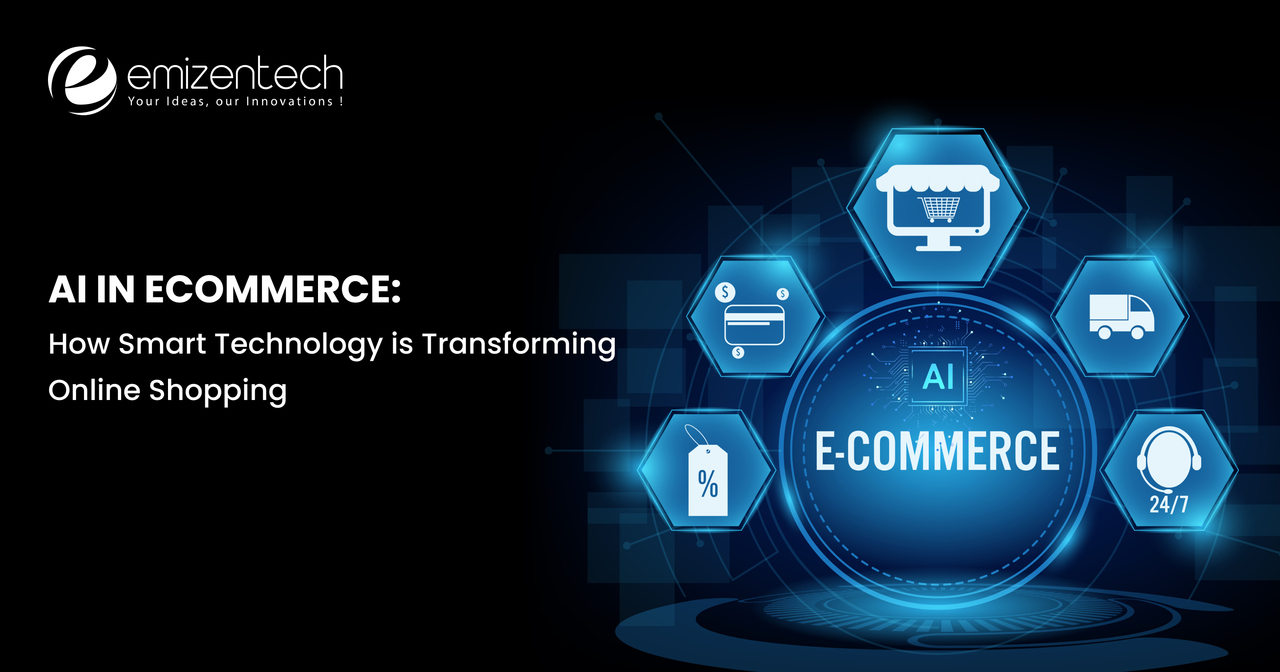AI in eCommerce: How Smart Technology is Transforming Online Shopping

A Digital store that is smart enough to understand exactly what you want and how you will purchase it, that’s AI in eCommerce. With the significant rise in the popularity of online shopping, AI has become a crucial aspect for e-commerce growth. From personalized product recommendations to AI agents for real-time customer support, AI is revolutionizing the way enterprises develop and manage to grow online. The global artificial intelligence market is projected to grow at an annual compound growth rate (CAGR) of 36.89%, while the AI-driven e-commerce sector is estimated to reach $8.65 billion, growing at a CAGR of 14.6%. This report shows rapid adoption and investment in AI technology by e-commerce companies.
This has impacted consumers' buying patterns as well; nowadays, more than 50% of buyers are shifting towards digital shopping, as it enhances the shopping experience. Using AI makes the whole shopping experience flawless and hassle-free with personalized suggestions and 24-hour support with virtual chatbots, for a more refined customer experience with faster responses and engaging conversations.
From the perspective of an ecommerce development company, AI use cases in e-commerce, such as predictive analytics, natural language processing, and machine learning, improve inventory management, automate marketing, and personalize user experiences. AI enables businesses to meet rising consumer expectations, improve operational efficiency, and grow profits.
Why AI is the Future of eCommerce Development?
Artificial intelligence is the future of e-commerce development because it makes shopping easier for customers and selling for businesses. The use of AI in e-commerce provides added benefits, such as generative AI, advanced AI tools, and automation, all of which can enhance the online shopping experience.
- Generative AI can write product descriptions quickly and with quality, helping customers better understand and find products on the store's website.
- AI analyzes consumer preferences and suggests products, allowing customers to identify items based on their previous purchasing and browsing activities. As a result, AI product recommendations keep customers engaged, drive sales, and benefit sellers.
- AI enables product searches using images or natural keywords and phrases, allowing customers to find relevant products easily.
- AI-powered chatbots provide efficient customer service by answering questions, providing meaningful and relevant support, and contributing to a better customer experience.
- Using AI, you get data-driven analyses of consumer purchasing patterns based on feedback, which allows for specific personalized suggestions as per consumer interests.
Hence, using AI in e-commerce helps online e-commerce stores work smarter and makes shopping experiences more personalized for customers.
Top Use Cases of AI in eCommerce
There are numerous applications for AI; here are some popular examples of how to use AI in e-commerce.
Product Recommendation
AI understands customers' interests by analyzing their browsing and buying patterns. Using this information, it suggests products to potential buyers. This makes the process of customers finding things more efficient, which leads to an increased likelihood of a sale to stores.
Visual Search and Image Recognition
AI gives customers the ability to search by image instead of text. For example, when you upload a picture of a shirt, then AI can identify shirts that the retailer has similar to the one in the photo. This gives leisure to the shopping experience in addition to ease of use for the customer.
Chatbots and Customer Service
AI-based chatbots can help customers with their questions at any point in the day or night. AI chatbots can assist customers with issues quickly without needing a human. This improves customer satisfaction while saving time for the business.
Inventory Management And Pricing Optimization
AI trackers improve inventory management by ensuring that products are not out of stock or do not have too much inventory. Furthermore, it suggests the best price to sell the products based on demand and competition, resulting in increased profits for the company.
Benefits of Using AI in eCommerce development
Artificial intelligence is changing the online e-commerce management and shopping experience. E-commerce businesses are using AI to make customer experiences more convenient and faster. Consulting with an e-commerce app development company can help you build a strong online presence. Benefits of AI in e-commerce:
Enhanced User Experience
AI can enhance the level of convenience, flow, and enjoyment in every shopping experience. The use of chatbots and virtual assistants can help a business provide answers to customer questions at any hour of the day. Smart recommendations highlight products that match a user's preferences and previous purchases, making the shopping experience easier and encouraging repeat visits.
Better Decision-Making
AI tools can analyze customer data, purchasing habits, and market trends in minutes. Business leaders can use these customer-leading insights to inform more effective pricing, stock management, and marketing plans, removing the guesswork from planning and putting them in a position to outperform competitors.
Increased Sales and Retention
Targeted product recommendations, automatic email marketing, and dynamic pricing ultimately lead to more sales. AI is also capable of collecting data about customers who show tendencies to leave and recommending ways to attract them back to the purchasing experience. The outcome is increased customer loyalty and increased profits over time.
How to Implement AI in Your eCommerce Store?
Integrating AI into your digital store is a must for a flawless customer experience and to increase sales. Here is a step-by-step guide for a seamless AI integration.
Focused Approach
Let's start with the very basics. You should understand what you want to achieve using AI. Being precise with your goals will give you the ideal framework for prioritizing the important things first, as AI can assist you with personalized shopping suggestions for specific customers, manage pricing, and predict buying preferences
Evaluate Your Existing Technology
Examine your current eCommerce platform and existing technology stack. You must ensure that it supports AI tools and is more likely to include APIs or add-ons that make it easy to integrate AI into eCommerce systems.
Select the Best AI Tools
Along with AI-powered tools (such as chatbots, recommendation engines, or pricing algorithms), platforms like Shopify, Magento, or WooCommerce also have various plugins for AI features. You should also consider using generative AI to assist in producing product descriptions or marketing material.
Engage a Professional eCommerce Development Company
A professional eCommerce development company can also walk you through and help you pick the best AI solutions for your goal and integrate them seamlessly into your online portfolio. Collaborating with e-commerce developers ensures that your AI integrates well with existing systems.
Test and Optimize
Once you have implemented AI features, monitor how they are being received. Measure how customers utilize the AI and the effect AI features have on sales, then make adjustments as necessary to increase effectiveness.
Conclusion
The future of AI in e-commerce is promising and full of opportunities. AI allows online retailers to personalize and streamline the shopping experience. Additionally, generative AI advancements will facilitate the speedy creation of product descriptions and marketing content, while predictive AI will help retailers better forecast sales and manage inventory. AI agents will assist customers by optimizing shopping experiences and automating the process. To remain competitive, eCommerce businesses must implement AI sooner and collaborate with eCommerce developers who specialize in AI projects while remaining open to innovation.
FAQs
What is the future of AI-powered customer experience?
AI-driven customer experience is the future of E-commerce with in-depth predictive analysis, tailored suggestions, and a robust backend, all will empower e-commerce by adapting to user needs with AI.
What are the benefits of using AI for online shopping?
The benefits include improved product recommendations, faster customer service, lower return rates, automated backend operations, and a seamless AI shopping journey across devices and platforms.
Can you help me integrate AI with my existing E-commerce platforms?
At Emizentech, we have a talented pool of AI engineers who can seamlessly integrate AI into your eCommerce platforms. We build AI solutions that are modular, scalable, and adaptable, allowing businesses to automate their business operations, streamline various processes, and personalize shopping experiences.
How is AI used in e-commerce?
Artificial intelligence (AI) has numerous applications in e-commerce. Some examples include personalized product recommendations, chatbots for customer service, pricing optimization, demand forecasting, smart search, and logistics optimization.
What are the top five AI applications?
AI can help financial services institutions in five general areas: personalize services and products, create opportunities, manage risk and fraud, enable transparency and compliance, and automate operations and reduce costs






Please sign in or register for FREE
If you are a registered user on AVIXA Xchange, please sign in